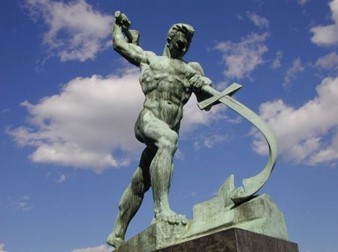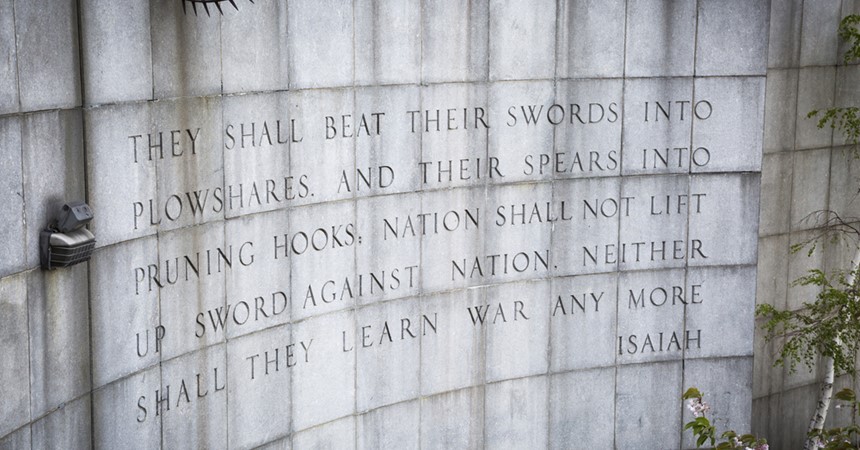It was lovely to walk into the Cathedral on the weekend, to see this colour, reminding us of the change of liturgical season and our call to ready ourselves for the coming of our saviour. Of course, in Australia we are entering summer while in the Northern Hemisphere, they are going into winter. What a great contrast.
I hope you have joined an Advent reflection group or are being nourished by reading and reflecting on the scriptures from each day of this season. Over the coming four weeks, I will be joining an online webinar, whose focus is on each of the week’s scripture readings.
The presenter for the First Reading from Isaiah (2:1-5) drew our attention to the Isaiah Wall and sculpture at the front of the United Nations.
The Book of Isaiah contains the following passage: "They shall beat their swords into ploughshares, and their spears into pruning hooks; nation shall not lift up sword against nation, neither shall they learn war any more." The sculpture was gifted to the United Nations by the USSR on December 4th, 1959.

It was not lost on me that the gift of the sculpture and beating swords into ploughshares was gifted to the United Nations by the USSR. I am sure the people of both Ukraine and Russia are hoping for such a resolution to the current conflict.
As I proclaimed the first reading at Mass on Sunday night, at the Cathedral, I felt drawn to these words from Isaiah and the ongoing call on us to be a people of unity and peace.
The reading finishes with the words:
Let us walk in the light of the Lord.
And the last verse of the psalm (Psalm 121)
For love of my brethren and friends
I say: ‘Peace upon you!’
For love of the house of the Lord
I will ask for your good.
Interestingly, we begin Advent with the gospel reading from chapter 24 of Matthew, which is near the end of his gospel. The reading is a reminder for us to stay awake and be ready. We are being invited to walk in God’s light, to live each day by being respectful and loving towards each other.
I have frequently been drawn to the following paragraphs by Bishop Michael Putney, which I found in a small publication, Mind the Gap - The Church in Australia 40 years after the Second Vatican Council. He is quoting Donald Senior cp, who offered a biblical insight into how we might find our way forward into God’s future. Senior said:
It has always intrigued me that in biblical Hebrew the ways of referring to past and future has the opposite orientation than does either English or French. While we say the past is behind me and the future is in front of me, the biblical idiom is the opposite: i.e., the past is in front of me (before my face), and the future is behind me (at my back). The image is visual, something like rowing a boat across the lake. The receding shoreline is “in front of you” – where you are headed is at your back, behind you. You view the “past” – the receding shore - in order to fix your course for where you are going.
This is how the Scriptures function for us, it strikes me. We view our sacred past not out of nostalgia but to find there the footprints of God, the traces of our religious roots in order to give us direction for the future which we cannot see, but which we know God holds out for us.
During Advent, we are being called to look at our past while rowing the boat into an unknown future. The waters on which we row our boats are at times smooth, at other times a bit turbulent, and then at other times ferocious. No matter the conditions, we are being called to keep rowing with our focus on the receding shoreline, the stories of our beliefs, teachings, values and heritage. These are our memories and meanings.
Let’s keep our eye on the messages of our tradition so that we can live as a renewed humanity, with peace at its core.
May your pilgrimage through Advent be a sacred and holy one.
Image: Glynnis Jones / Shutterstock.com
Follow mnnews.today on Facebook.

